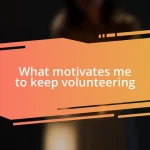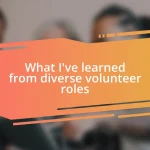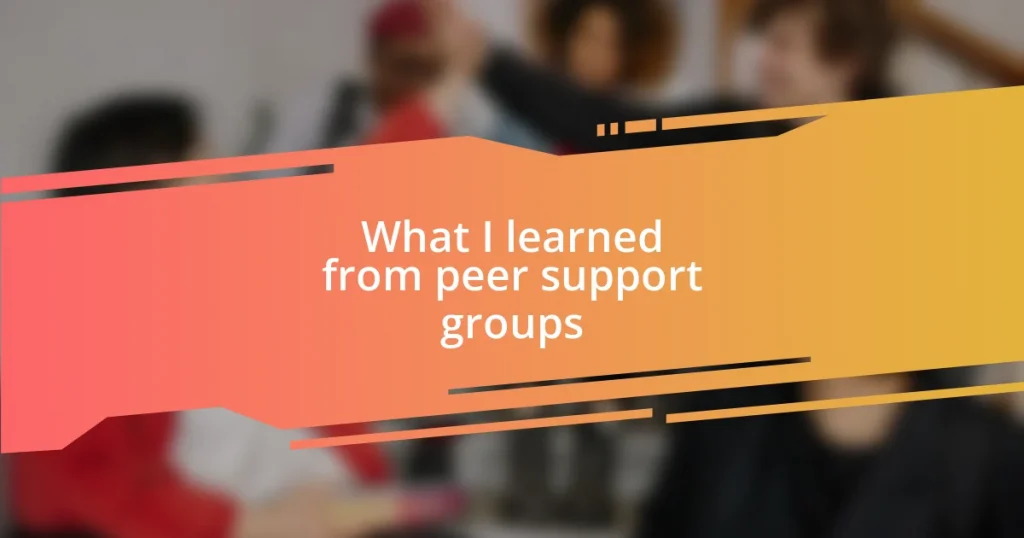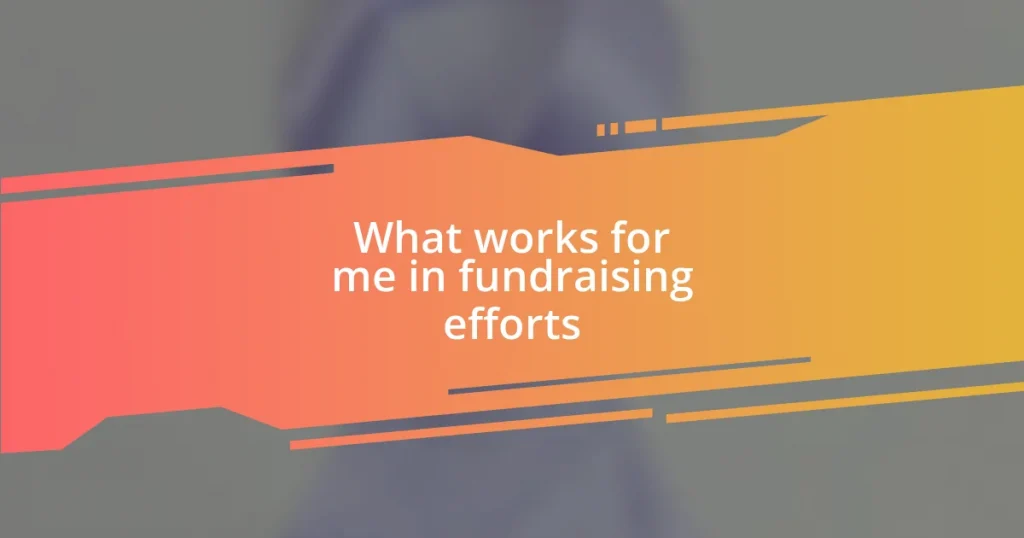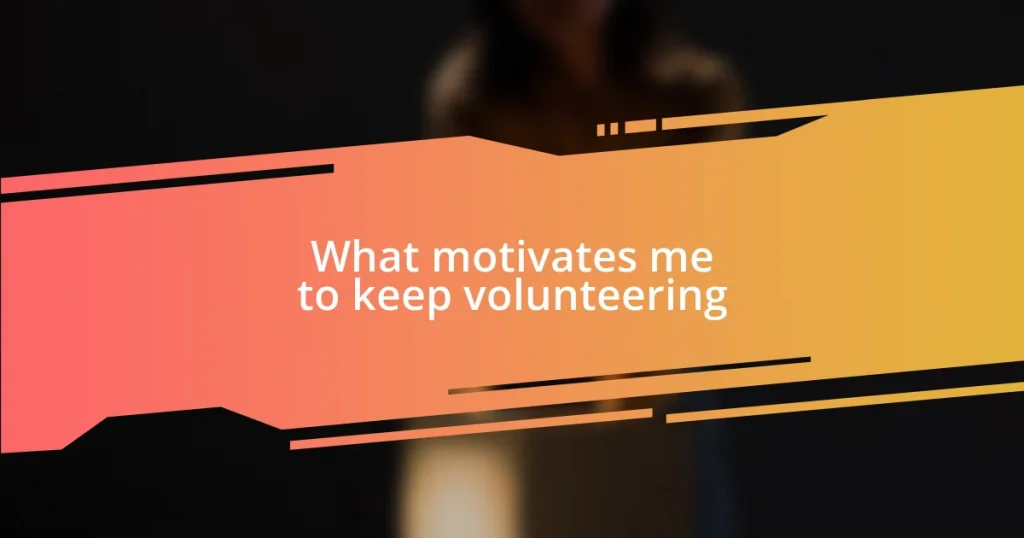Key takeaways:
- Peer support groups create a safe environment for individuals to share vulnerabilities, fostering emotional support and a sense of belonging.
- Members develop key skills such as active listening, empathy, and conflict resolution, which enhance personal relationships outside the group.
- Real-life applications of lessons learned from the group, such as self-compassion and reframing negative thoughts, significantly improve daily life and interactions.
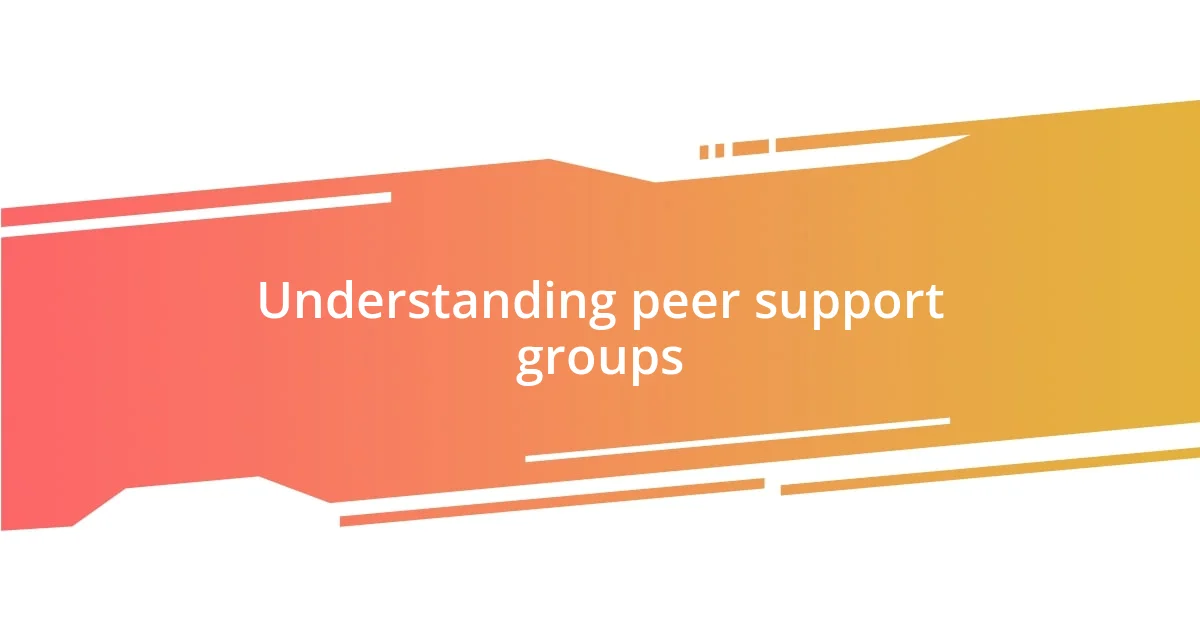
Understanding peer support groups
Peer support groups are unique spaces where individuals connect over shared experiences. I remember my first meeting; I felt a mixture of nervousness and hope. What’s amazing is how quickly that fear dissipated as I realized everyone was there to share their struggles and triumphs without judgment.
These groups foster a sense of belonging that can be hard to find elsewhere. It’s like finding a second family—you bond through vulnerability. Have you ever experienced that moment when someone else’s story resonates so deeply that it feels like they’re articulating your own thoughts? That’s the power of peer support; it reminds you that you’re not alone in your journey.
Moreover, peer support groups are rooted in mutual understanding and empathy. Participants often find that their insights and advice arise from personal experiences, making their support genuinely relatable. I once had a member share how they navigated a difficult situation, and it wasn’t just helpful—it sparked a new approach for me. It’s these shared narratives that transform a simple gathering into a supportive community.
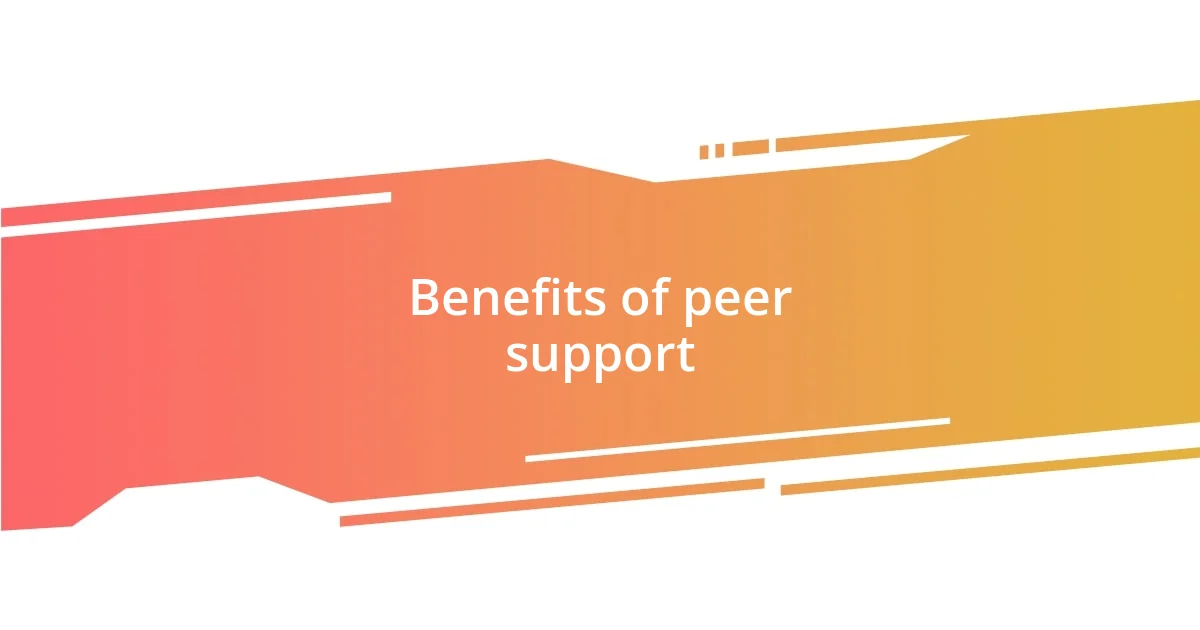
Benefits of peer support
Peer support groups offer numerous benefits that can enrich our lives in profound ways. For one, they provide emotional support that is often hard to come by in our everyday lives. I remember one particular session where someone openly cried about their struggles, and suddenly, it felt safe for all of us to express our own feelings. That shared vulnerability created a powerful bond, and knowing others understood my struggles helped me feel validated and less isolated.
In addition to emotional support, these groups foster personal growth through shared wisdom. I distinctly recall a moment when a fellow member shared their coping strategies for dealing with anxiety. Listening to their story changed my perspective entirely. It inspired me to adopt techniques I had never considered, highlighting how collective experiences can lead to innovative solutions.
Lastly, peer support can empower individuals, giving them a sense of control over their lives. I’ve seen members transition from feeling defeated to taking active steps toward their recovery goals, all because of the encouragement and accountability found within the group. Watching someone set a goal and achieve it, supported by peers, is a beautiful reminder that we are stronger when we uplift one another.
| Benefit | Description |
|---|---|
| Emotional Support | Fosters a safe environment where members can share feelings. Creates a sense of belonging. |
| Personal Growth | Encourages individuals to learn from others’ experiences and apply new coping strategies. |
| Empowerment | Supports members in setting and achieving personal goals, boosting confidence. |
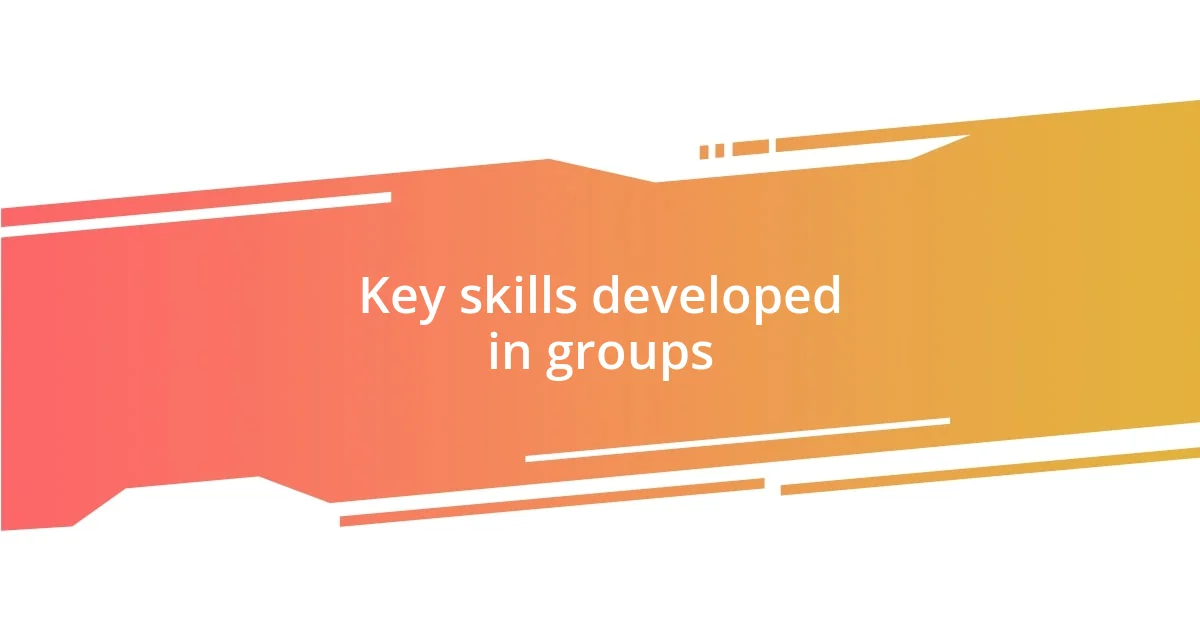
Key skills developed in groups
Developing key skills in peer support groups can transform not just how we relate to ourselves but also how we interact with others. I’ve personally grown tremendously in my ability to listen actively. At one meeting, I simply sat back and focused entirely on another member’s story. It struck me how powerful it felt to be present and fully engaged; it made me realize that sometimes, being heard is more valuable than offering solutions.
In addition to listening, I honed skills like empathy and conflict resolution. These groups taught me the importance of respect and understanding differing viewpoints, which are essential in any community. Here’s a quick look at some key skills developed in peer support settings:
- Active Listening: Practicing undivided attention and genuinely considering others’ thoughts and feelings.
- Empathy: Cultivating the ability to connect emotionally and understand perspectives that differ from our own.
- Communication: Articulating thoughts in a way that fosters dialogue and encourages openness.
- Conflict Resolution: Learning how to navigate disagreements constructively, helping to maintain a harmonious group dynamic.
- Teamwork: Collaborating effectively, recognizing that everyone has unique strengths and insights to contribute.
I often reflect on how these skills have spilled into my personal life, enhancing my relationships outside the group. Every interaction feels a bit richer and more connected.
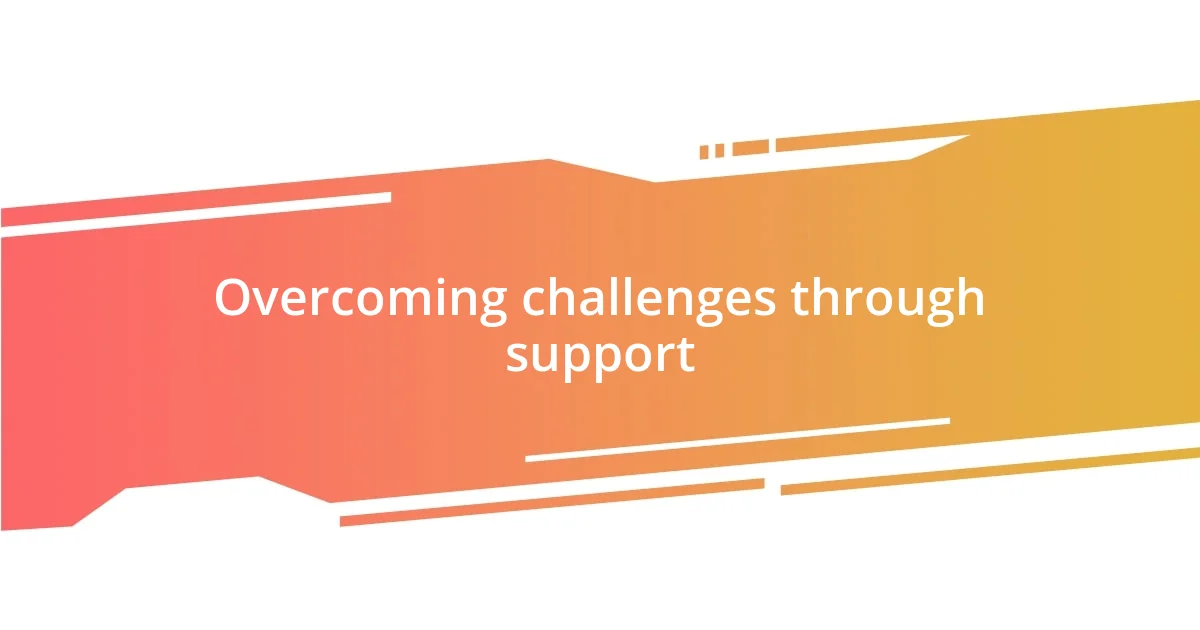
Overcoming challenges through support
Overcoming challenges through support is truly a remarkable experience. There was a time when I was grappling with a significant setback, and I felt paralyzed by self-doubt. In one of our meetings, a peer shared their own story of resilience, detailing how they navigated a similar struggle. Hearing how they overcame their obstacles not only inspired me but also made me realize that I wasn’t alone in facing these challenges. Isn’t it amazing how one shared experience can light the path forward for another?
The encouragement I found in the group was transformative. I vividly remember a moment when I hesitated to speak up about my fears, but the compassionate nudging from fellow members gave me the confidence to share. The moment I voiced my challenges, I felt an immense weight lift off my shoulders. I began to see every struggle not as a dead end but as a stepping stone, supported by kindred spirits walking similar paths. It’s in these moments of collective courage that we find our strength.
What really struck me was the realization that support extends beyond just sharing stories; it fosters an environment where we can all grow. I’ve witnessed how members tackle setbacks together, celebrating each small victory along the way, and it’s a reminder of the power of community. Isn’t it remarkable that support can turn what feels like an insurmountable mountain into a hill we can climb together? Each member’s triumph fuels the group’s collective spirit, proving that with empathy and encouragement, we can truly overcome even the toughest challenges.
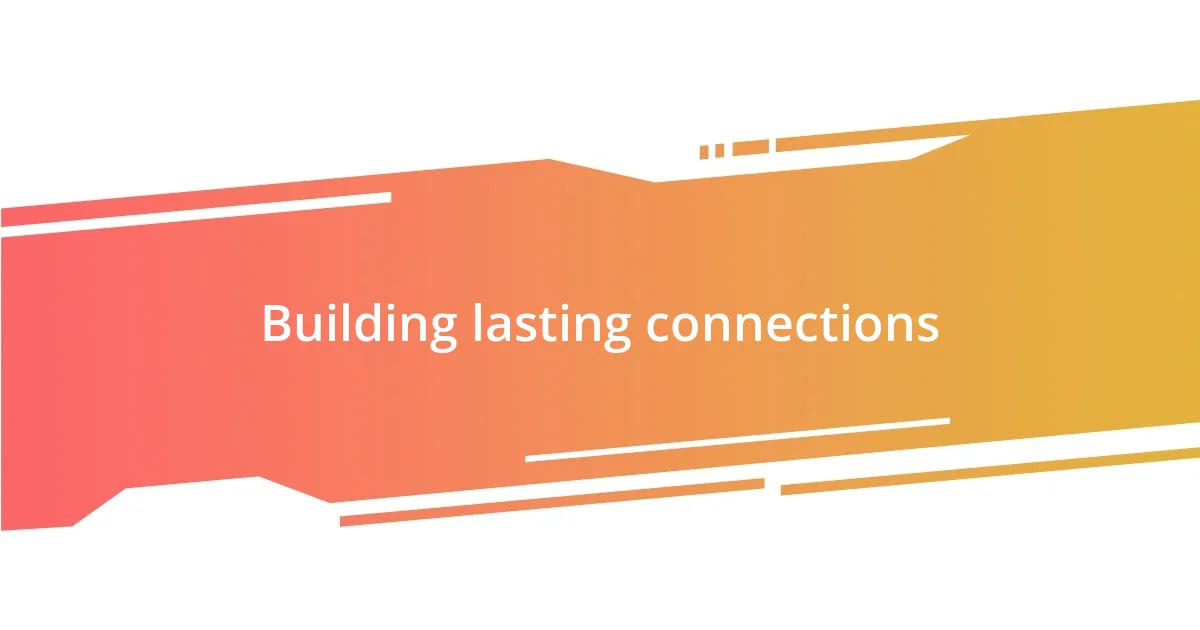
Building lasting connections
Building lasting connections within peer support groups has been one of the most enriching experiences in my life. I still remember my first meeting; I walked in feeling a bit lost, yet I quickly realized that the warmth and openness of the group created a sense of belonging. Over time, I bonded with members who shared their vulnerabilities, which made me feel safe to do the same. Did you ever think about how sharing our stories can create an invisible thread that connects us? It’s incredible how these shared moments can lay the groundwork for lasting friendships.
As trust grew among us, I witnessed relationships evolving beautifully. We became each other’s go-to support system, celebrating milestones and rallying around tough times. I recall a member who faced a job loss; everyone pooled their resources and connections to help him find new opportunities. This experience taught me that a true connection is often built through mutual support in both joyful and challenging moments. Isn’t it amazing how those moments of giving can strengthen our bonds even further?
Looking back, I realize that these connections extend far beyond the meetings themselves. We exchange messages, check in with each other, and even meet outside the group. The friendships I’ve formed are woven into the fabric of my daily life and have enriched my journey in ways I never anticipated. Connecting with others who understand and share similar experiences creates a support network that’s truly invaluable. Have you ever felt that sense of community that makes you feel like you belong? I know I have, and it’s a feeling I continue to cherish.
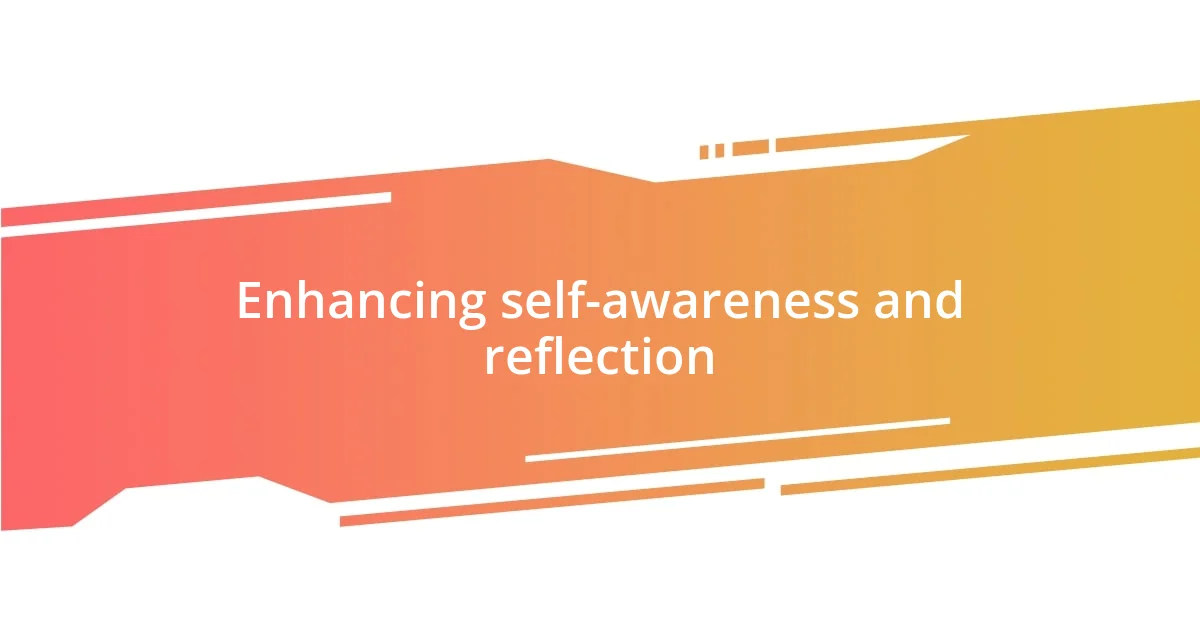
Enhancing self-awareness and reflection
The experience of being part of a peer support group has profoundly enhanced my self-awareness and reflection. In one session, a fellow member shared their struggle with anxiety, and I found myself connecting deeply with their experience. It struck me how often I brushed my own feelings aside. This moment prompted me to take a hard look at my emotions, realizing that acknowledging them is the first step to understanding myself better. Reflective questions like, “What triggers my own anxiety?” began to surface as a natural part of our discussions. Isn’t it fascinating how sharing our vulnerabilities can open doors to self-discovery?
Engaging in these candid conversations acts as a mirror, reflecting aspects of myself that I might overlook in my daily life. I remember one night after a particularly candid exchange about handling stress—one that challenged my coping strategies—when I began journaling my thoughts daily. This simple practice has not only deepened my self-reflection but has also made me more aware of my emotional triggers. How many times do we let life pass us by without pausing to consider how we truly feel? I learned that taking that pause, facilitated by the group’s support, can be a game-changer.
The power of vulnerability extends beyond initial sharing; it invites a continued journey of self-exploration. After each meeting, I’ve made it a habit to ask myself what I learned from both my reactions and the experiences shared by others. This ongoing reflection has helped me gain a richer perspective on my behaviors and choices. For instance, when someone recounted their efforts to practice self-compassion, it prompted me to evaluate my own self-talk. When was the last time I treated myself with kindness? Each realization I’ve encountered in the group has been vital in shaping my personal growth into a more compassionate and aware version of myself.
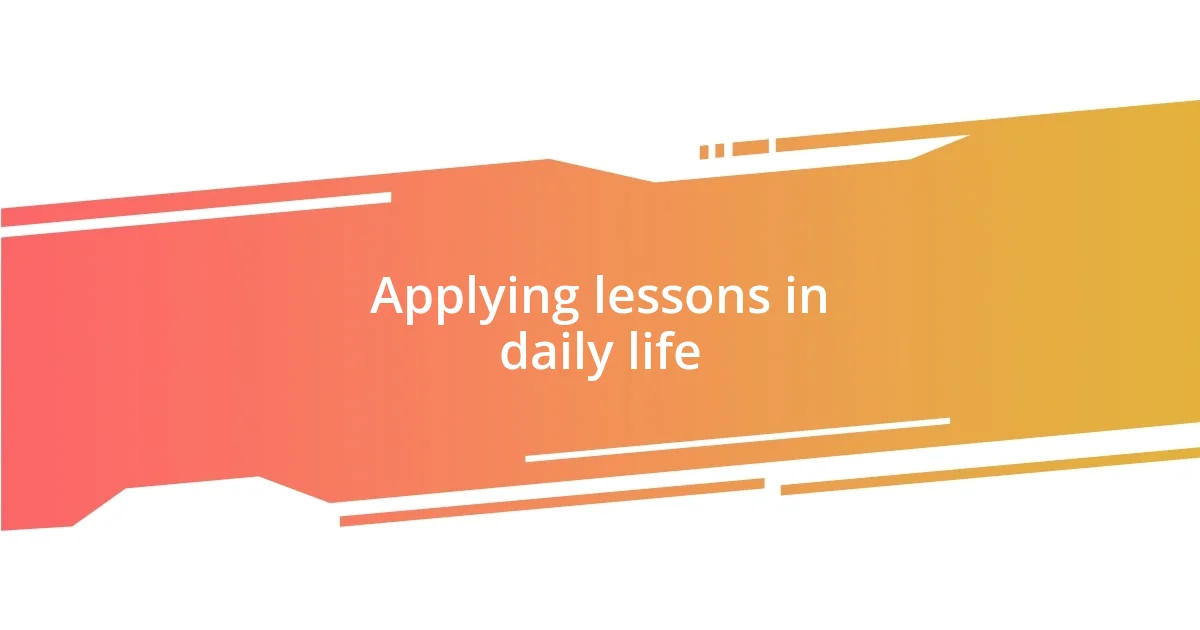
Applying lessons in daily life
Applying the lessons from peer support groups has truly transformed the way I navigate my daily life. One time, during a particularly tough week, I caught myself spiraling into negative thoughts. Instead of dismissing them, I remembered a member’s advice on reframing negative narratives. I took a moment to intentionally flip my thoughts, asking, “What’s something positive I can focus on right now?” This simple shift not only lifted my spirits but also nurtured a proactive mindset that I now cherish.
Incorporating active listening into my interactions has been another valuable lesson that I applied outside the group. There was a day when a friend sought my guidance on a personal issue; I realized that my instinct was to jump in with solutions. Yet, I recalled how our group emphasizes listening without interruption. So, I let my friend share fully without interjecting, which led to a more meaningful connection and allowed them to arrive at their own insights. Doesn’t it amaze you how being present for someone else can foster deeper relationships?
Perhaps the most significant lesson has been practicing self-compassion daily. Whenever I face setbacks—like forgetting an important appointment—I find myself rooted in a tendency to berate myself. But remembering a fellow member’s story about forgiving themselves for similar slip-ups helps me pause. I now say, “It’s okay; we all have moments like these.” This daily practice has not only softened my inner dialogue but has also made my approach to challenges more balanced and forgiving. Isn’t it remarkable how learning from each other can lighten the weight of our own experiences?


